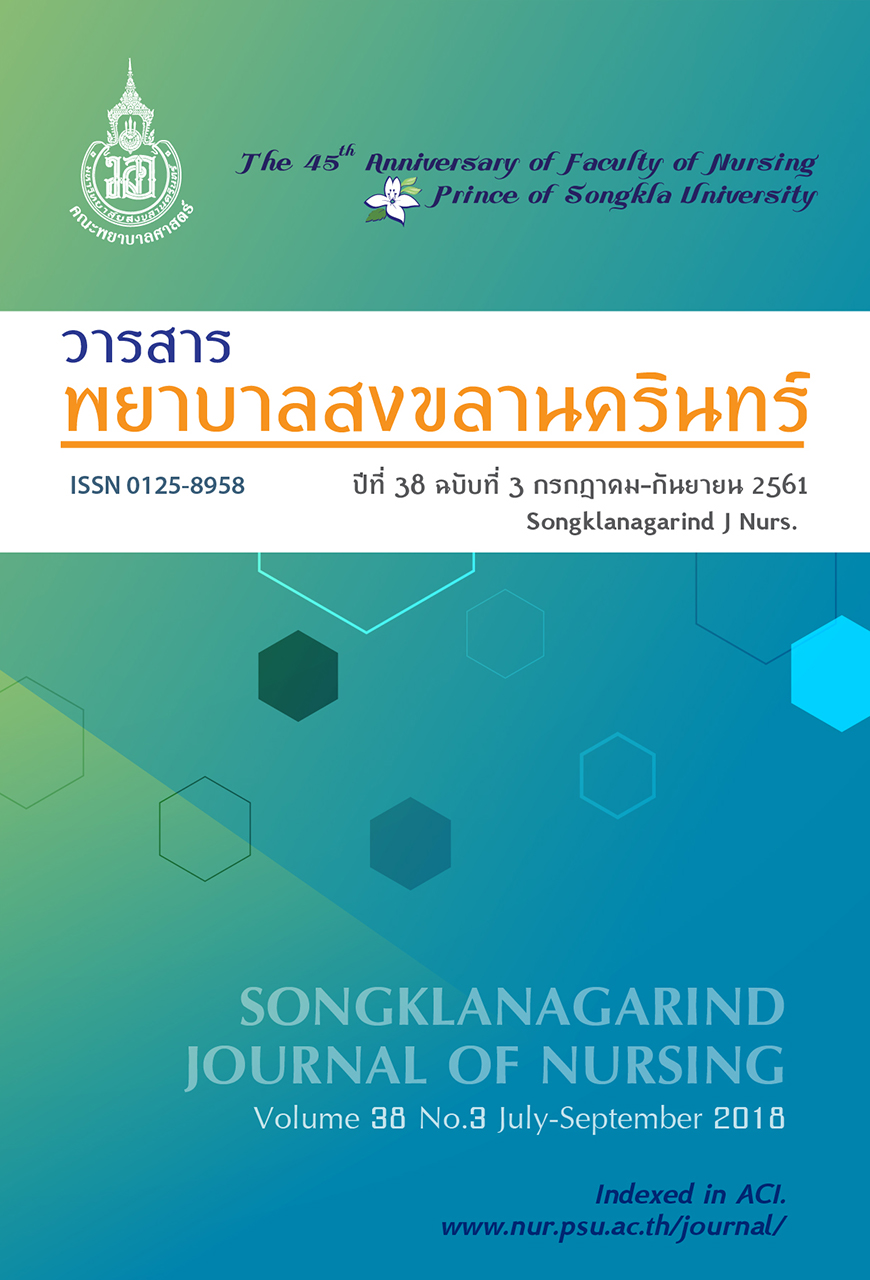Moral Problems and Moral Courage in Nursing Practice of Nursing Students in Nursing Colleges, Southern Thailand: Critical Incident Technique
Main Article Content
Abstract
The purpose of this study was to explore critical incidents of moral problem in nursing practice and
the actions of moral courage which were demonstrated in dealing with those moral problems. In this study,
fifty participants were selected to be interviewed. The interviews were transcribed to develop relevant themes
using the critical incident analysis technique. Trustworthiness was established following Lincoln and Guba’s
criteria. The results included five themes of moral problems of critical incidents in nursing practice 1)
Compromised patient safety, 2) Substandard quality of care, 3) Lack of adequate information, 4) Lack of
concern for the patient’s needs, and 5) Privacy and confidentiality violation. The participants demonstrated
their moral courage in various ways; 1) Providing information in respecting patient’s rights, 2) Intervening to
prevent further harm to the patients, 3) Declaring own mistake, 4) Encouraging quality of care, 5) Notifying
health care team about patient’s needs, 6) Responding to the patient’s need in accordance with patient’s rights
and 7) Taking action to maintain patient privacy and confidentiality. The results of this study will increase
awareness of the importance of teaching moral courage in nursing education.
Article Details
References
2. Edmonson C. Moral courage and the nurse leader. OJIN. 2010; 15(3): 10-9. doi: 10.3912/OJIN
3. Leuter C, Petrucci C, Mattei A, et al. Ethical difficulties in nursing, educational needs andattitudes about using ethics resources. Nurs Ethics. 2013; 20(3):348-58. doi: 10.1177/0969733012455565
4. Mellahi K, Collings DG. The barriers to effective global talent management. The example ofcorporate elites in MNEs. Journal of WorldBusiness. 2013; 45(2): 143-49. doi.org/10.1016/j.jwb.2009.09.018
5. Murray JS. Moral courage in healthcare: Actionethically even in the presence of risk. OJIN. 2010;15(3): 1-9.doi: 10.3912/OJIN.Vol15No03Man02
6. Sekerka LE, Bagozzi RP. Moral courage in the workplace: Moving to and from the desire and decision to act. Business Ethics. 2007; 16(2): 132-3. doi: 10.1111/j.1467-8608.2007.00484.x
7. Setiawan, Chaowalit A, Suttharangsee W. Ethical dilemmas experienced by nurses in providing care for critically ill patients in intensive care units, Medan, Indonesia. Songkhla Med J. 2004; 22(4): 221-9.
8. Donnellan JJ. A moral compass for management decision making: A healthcare CEO’s reflections.Front Health Serv Manage. 2013; 30(1): 14-26.
9. Hallin K, Danielson, E. Registered nurses’perception of their work and professional development. J Adv Nurs. 2008; 16(1): 62-70. doi: 10.1111/j.1365-2648.2007.04466.x
10. Cohen JS, Erickson JM. Ethical dilemmas and moral distress in oncology nursingn practice. Clin J Oncol Nurs. 2006; 10(6): 775-83. doi: 10.1188/06.CJON.775-780
11. Cerit T L. Moral courage in organization: Doing the right thing at work. Journal of Business Ethics Education (JBEE). 2011; 8, 410-415.
12. Andrews PE. The courage to explore the inner work of educational leaders. [Internet].[cited 2008 Mar 22]. Available from: http://citeseerx.ist.psu.edu/viewdoc/download?doi=10.1.1.606.2775&rep=rep1&type=pdf 13.
13. Austin W, Lemereyer G, Goldberg L, et al. Moral distress in healthcare practice: The situation of nurses. HEC Forum. 2005; 17(1): 33-48.
14. Iseminger K. Overview and summary: Moral courage amid moral distress: Strategies for action. OJIN. 2012; 15(3): 1D-4. doi: 10.3912/OJIN.Vol15No03ManOS
15. Flanagan JC. The critical incident technique. Psychol Bull. 1954; 51(4): 327- 58.
16. Holloway I, Wheeler S. Qualitative research in nursing and healthcare. 3th ed. Chenni: KHL Printing; 2010.
17. Blackman I, Henderson J, Willis E, et al. Factors influencing why nursing care is missed. J ClinNurs. 2015; 24(1-2): 47- 56. doi: 10.1111/jocn.2688
18. Crigger NJ, Meek VL. Toward a theory of self-reconciliation following mistakes in nursing practice. J Nurs Scholarsh. 2007;39(2):177- 83. doi: 10.1111/j.1547-5069.2007.00164.x
19. Kunaviktikul W, Anders RL, Sripuphan W, et al. Development of quality of nursing care in Thailand. J Adv Nurs. 2001;36(6):776-84.
20. Beauchamp TL, Childress JF. Principle ofbiomedical ethics. 7 th ed. New Yourk: Oxford University Press; 2013.
21. Hamric AB, Arras JD, Mohrmann M E. Must we be courageous?. Hastings Cent Rep. 2015; 45(3): 33-40.
22. Nantsupawat P, Srisuphan W, Kunaviktikul W, et al. Impact of Nurse Work Environment and Staffing on Hospital Nurse and Quality ofCare in Thailand. Nursing Scholarship. 2011;43(4),426-433. doi: 10.1002/hast.449
23. Batch M, Windsor C. Nursing casualization and communication: A critical ethnography. J Adv Nurs. 2015;71(4):870-80. doi: 10.1111/jan.12557
24. Robinson FP, Geraldine G, Slimmer LW, et al. Perceptions of effective and ineffective nurse-physician communication in hospitals. Nurs Forum. 2010;45(3),206-16. doi: 10.1111/j.1744-6198.2010.00182.x
25. Jahromi VK, Tabatabaee SS, Abdar ZE, et al.Active listening: The key of successful communication in hospital managers. Electron Physician. 2016;8(3):2123-8. doi: 10.19082/2123
26. Giordano K. Examining nursing malpractice: A defense attorney’s perspective. Critical Care Nurse;2003; 2(23): 104-8.
27. Laukkanen L, Suhonen R, Leino-Kilpi H. Solving work-related ethical problems: The activities of nurse managers. Nurs Ethics. 2016; 28(8): 838- 50. doi: 10.1177/0969733015584966
28. Pianalto M. Moral courage and facing others. IJPS. 2012; 20(2): 165-84. doi: 10.1080/09672559.2012.668308
29. McParland J, Scott P A, Arndt M, et al. Autonomy and clinical practice 2: patient privacyand nursing practice. BJN. 2002;9(9): 566-9.
30. Shahriari M, Mohammadi E, Abbaszadeh A,et al. Perceived ethical values by Iranian nurses. Nurs Ethics. 2012;19(1):30-44. doi: 10.1177/0969733011408169
31. Liaschenko J, Elizabeth P. Fostering Nurses’ moral agency and moral identity:The importanceof moral community. Hastings Cen Rep. 2016;46(Suppl 1):S18-21. doi:10.1002/hast.626

